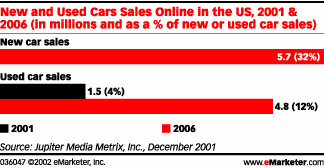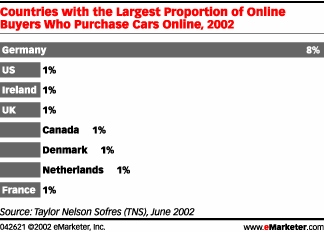Net Steers Car Buyers to Dealers

Though Jupiter data suggests nearly one-third of new car sales will originate online by 2006, other research points to a more tepid market.

Will the internet put an end to the time-honored consumer tradition of going to a car dealer, kicking the proverbial tires and taking a prospective purchase out for a test drive? Jupiter Media Metrix suggests that a few years down the road, this might be the case, at least in the US. In December 2001, with the heyday of the internet economy long past, Jupiter predicted that by 2006, 32% of all US new car sales ? totaling 5.7 million vehicles ? would take place online, up from an estimated 13% in 2001. In similar fashion, the used car segment is predicted to undergo extensive changes, with online sales tripling from 4% of the total in 2001 to 12% in 2006.
Ample evidence exists that consumers go online at the beginning of the car shopping process. The Vividence Corporation found that 94% of US car buyers went online as a first step, versus 82% who visited specific automaker websites and 67% who went into an actual dealership. The primacy of the internet at this stage of purchasing is unsurprising. Consumers can avail themselves of numerous websites offering vehicle reviews, model comparisons and reliability data. In addition, on most automaker websites, they can configure the desired model with preferred options and features and ultimately come up with a price.
Quality and satisfaction rating firm J.D. Power and Associates came up with results similar to Vividence in a survey of 27,383 consumers who purchased a car in 2002. It found that 60% of the respondents used the internet when shopping for a car. Of these roughly 16,000 consumers, 88% of visited automotive websites before physically going to a car dealership for a test drive, no doubt in large part to narrow down their brand and model choices. Overall, J.D. Power estimates that 4% of all new-vehicle buyers in the US used the internet as a purchasing tool in 2002, considerably below the figures quoted by Jupiter. Likewise, an annual global e-commerce survey by research firm Taylor Nelson Sofres (TNS) found that consumers in the US lag far behind those in Germany in terms of buying cars online.

The TNS findings suggest that European consumers and those elsewhere in the world are perhaps farther along in their use of the web as an automobile purchasing tool. However, Cap Gemini Ernst & Young?s ?Cars Online 2002? report, a study of consumer car-buying habits and preferences around the world, offers a divergent conclusion. The eight-country survey, which polled 2,500 consumers in the US, UK, Germany, France, Italy, Sweden, Benelux and Japan, as well as 10 original equipment manufacturers (OEMs) and 100 dealers in each nation, found that 80% of buyers continue to rely on visits to traditional franchised dealers as their main source of automotive information, with the test drive still the most important factor in the buying process. Less than 20% cited the internet as their main source of information.
With these findings in mind, Ernst & Young?s conclusion that the internet has had a ?negligible? impact on actual car purchasing is unsurprising. The survey found that the internet accounted for just 0.7% of overall car sales. However, a significant percentage of the consumers surveyed said they would consider buying a car online, whether directly from an OEM or dealer website or through an independent internet dealer. For now at least, most dealers view the internet as a source of opportunity for their businesses, as opposed to a threat.
In automotive as with many other retail categories, the internet has helped consumers to research and refine their purchase decisions. However, it looks as if kicking the tires still holds considerable appeal, as does the ability to build a relationship with a dealer. Until these criteria shift dramatically, the internet is likely to remain an auxiliary rather than the main sales channel for car buying.
Source:
http://www.emarketer.com/news/article.php?1001903&c=newsltr&n=analysis&t=ad